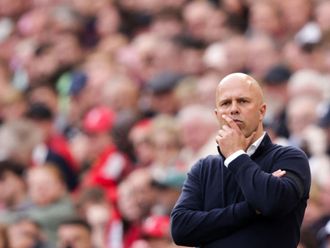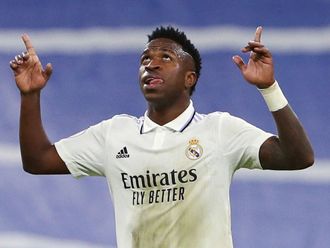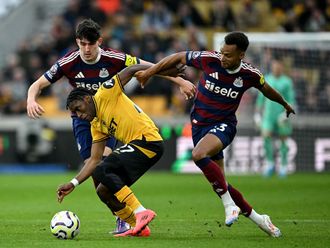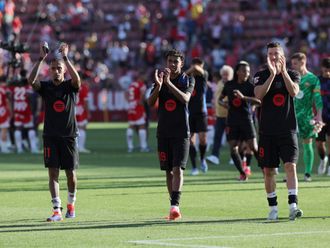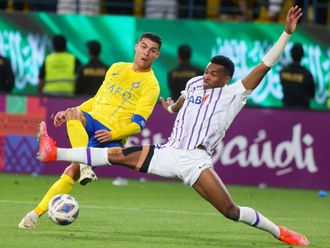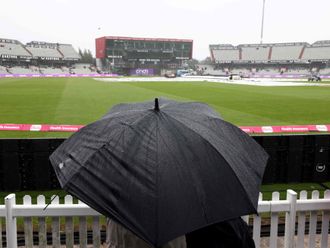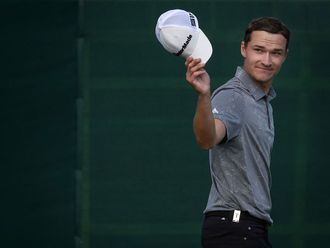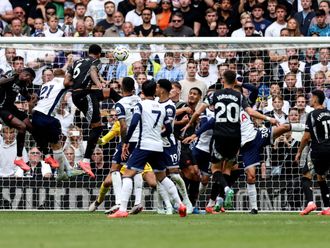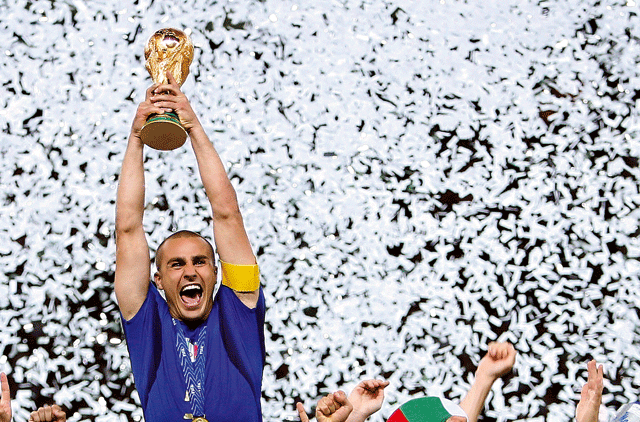
In ancient Roman mythology the souls of those most virtuous and brave went straight to the fields of Elysium, a paradisiacal land of plenty where only the best of the dead could spend eternity.
For modern Romans those same fields now have white markings, corner flags and a sign that reads Welcome to Al Ahli Club. As standard you get a tax free salary, year round sunshine, a villa beside Emirates golf course, the use of a luxury car and flights back to life once a month.
You get over Dh2 million every 20 times you pull a red jersey and take home Dh4.5 million plus bonuses amounting to Dh22.5 million, a season.
Okay, he's not dead and he's actually from Naples. But the point I'm trying to make is that 37-year-old, former Italian 2006 World Cup and World Player of the Year winning captain, Fabio Cannavaro has landed on his feet with his summer switch from Juventus to Dubai's Al Ahli Club. So much so, even aging Alessandro Del Piero and Gennaro Gattuso want to follow him there.
Just as Roman hell (Avernus) looked on the cards with Italy knocked out in the group stages of the 2010 World Cup and Juventus finishing seventh in Serie A, Cannavaro somehow ensured the good times kept rolling.
Now he can relax, because regardless of performance, rumoured contract clauses render his deal pricier for Al Ahli to terminate than to actually honour.
Romario, Weah, Guardiola and Batistuta may all have ‘seen-out' their careers in a similar manner throughout the GCC, but Cannavaro vows to quash suggestion, such as Ronald de Boer's, that this is just "a graveyard for European footballer's."
De Boer famously said of his time in Qatar that you get "well-paid to do what you like, no stress." But Cannavaro is wisely pitching his move as an inspiration to youth over and above one last pay-check.
"I would like to help the younger players achieve and hope they can gain from my experience. Possibly this will help them win something important in the future," He told reporters at his unveiling.
So can Cannavaro, as Beckham tried with his Dh24 million a season move to LA Galaxy, really raise the international profile of the UAE Football League on and off the pitch in only its third season of professionalism?
THE BUSINESS PERSPECTIVE
Iran manager Afshin Ghotbi, former technical assistant at LA Galaxy, suggests he already has. "The world will be watching, and surely that was the intention of his signing."
Ghotbi adds, "In the modern game, business and football decisions are always in duels. I have mixed feelings. The club shouldn't lose sight of youth development, but Cannavaro's contribution will definitely extend beyond the pitch."
The similarity to Beckham's move to the USA is uncanny. With Cannavaro recently voted the world's most attractive footballer it's obvious he remains, like Beckham, an all-round marketable package. But have Al Ahli signed him as a world-class defender or a licence to print money?
Ahmad Hammad, Al Ahli's CEO insists, "Cannavaro was a technical decision, not a business or commercial one. But it won't be a shame if we get a business benefit from him. He can be used as a tool for attracting fans."
Showtime Arabia EPL host Rob McCaffrey says everyone thought Beckham was on his way out when he went to LA Galaxy "but dear me didn't he sell a bag full of shirts? They got back what they paid for him in kit sales alone. It's all about publicity and marketing."
Swaidan Al Naboodah, vice-president of Al Wasl Club, doubts we'll see the same hype in shirt sales here given the development of the market, but said "He'll get people into stadiums and get fans of all nationalities excited."
Indeed local football hadn't featured on the radar of Italian expat Simone Callioni prior to Cannavaro's signing, but now he's vowing to follow the league, "I may even start going to the games. I doubt I'll go every week but at least once to see a piece of Italian history."
McCaffrey adds, "Signing a 37-year-old is not the way I would build a league or a football team, but I think they are definitely trying to attract the expatriates to watch local football."
That needs to be done in a number of ways over and above just signing high profile players, according to UAE-based football agent David Fenwick. "There needs to be a programme of awareness, English commentary, improved English media coverage with accessible fixtures listings.
The Asian Football Confederation (AFC) and UAE Football League (UFL) is promoting professionalism not only on the pitch but in the boardrooms. They have ambitions of making every club self-funded and commercially viable. If both are not achieved by 2012 the UAE will risk losing slots in continental competitions.
That's where Fenwick thinks Al Ahli and the UAE's interests lay, "Cannavaro is certainly more marketable for attracting sponsors. I've seen players come here before and they're not known outside their own countries, they're not bad players but from a revenue point of view they are of limited beneficial impact to the club. Cannavaro on the other hand is internationally recognised."
IS IT GOOD FOR THE GAME?
Romeu Castro, president of Brazilian club Saad, who specialises in linking his players up with GCC loans agreed, "In a marketing sense, with Cannavaro's move broadcast around the world during the World Cup was great advertisement for the UAE."
But he says playing-wise, "Hiring older footballer's is really bad for the long-term development of the league."
Castro suggested it's better to support a young foreign talent and help him grow with the club. That way he'll become attached and want to give something back. "The older guys don't really care and clubs aren't going to get back what they paid either in football or in cash," says Castro.
Castro held the Japanese and Korean leagues up as an example admitting that they brought in older players like Gary Lineker in the 1990's. But they also fed the youth ranks with imported talent like Ruy Ramos.
"It needs to be a top down, bottom up approach," says Tim March, general co-ordinator at Sharjah Club. But March flagged concern for the UAE FA's ditching of a policy to allow two young foreigners into each club's U-23 team. The move has forced clubs to only focus on top-down strategies like Cannavaro, which in Castro's opinion is not a sustainable business model.
On the contrary, Qatar who went through a phase of hiring ‘golden oldies' is now opening one space in each club's U-23 team for a young foreigner. Yousuf Abdullah, general secretary of the UAE FA has since said a move to allow young foreign players into every team's U-23 set-up is now on the cards.
"Qatar had Desailly, Batistuta, Guardiola - a lot of high profile signings. Did it have the desired affect? Well from a spectator's point of view probably not, but the sheer fact we're still talking about Qatar now obviously means something," says Fenwick.
Fenwick argued the expat community is larger in the UAE so a similar scheme here may be more successful in terms of filling stadiums. Incidentally Qatar's 2022 World Cup bid was heavily advertised on Al Jazira sports during the World Cup with Guardiola endorsing the campaign. No one can remember how he played in Qatar, but at the end of the day if the current Barcelona coach is backing your campaign does it really matter?
"You can argue older players aren't good for the sustainability of the league but by the same token they can pass on experience to younger players. That will affect the league, club and national team," argues Fenwick.
EXPERIENCE IS WHAT UAE FOOTBALL NEEDS
Former Scotland International Derek Whyte likened the influence Cannavaro would have on local youth to when Ravanelli and Juninho joined him at Middlesbrough. "I learnt so much as a young player from them in terms of diet and discipline."
Whyte added that Al Ahli players won't be the only beneficiaries, but also the UAE's next generation who'll have a sporting icon to look up to at a time when obesity and diabetes is prevalent among its youth.
Mark Bell, Al Ahli's sporting director bills Cannavaro's move as the region's greatest ever sporting unveiling saying, "His affect on the development of young players is one of the key reasons for bringing him here."
But Wigan goalkeeper Ali al Habsi, the only GCC-born player in Europe says the way to groom young Emirati players is to spend money on sending them out to the lower leagues of Europe, ten at a time at ages 18-19. "They'll come back and have a greater influence on their club, league and National team than one player coming in ever can."
Sam Allardyce, manager of Blackburn, acknowledged, with the experience of bringing Al Habsi to Bolton; it would be too hard to organise work permits for GCC players in Europe without enough caps or a sub-75 FIFA world ranking. (UAE currently are 88th).
Instead, Allardyce suggests, "The best thing to do is to continue to train your own players with these facilities, get higher standards in like Cannavaro and be patient. Put a five-year plan into place instead of one or two years."
Of the veteran's big money signing, Allardyce, who himself moved to the USA during his career, said "The media call it mercenary. But I think it's very positive. You create bigger and better interest if you bring in a player of that calibre. He'll be an outstanding success and get the whole team working even more professionally than they are now."
Swaidan al Naboodah from Al Wasl Club adds, "Getting an experienced player in is never wrong, but you must find a real professional who's passionate about the game. You don't want someone who's coming to give 50 per cent and relax. We must market ourselves as a stepping-stone to Europe not the other way around. This is not a retirement home."
Football pundit and goalkeeper coach John Burridge is certain Cannavaro hasn't come here for a holiday. "Whatever league you're in you play to win its second nature, he's a world class professional. Maybe he's chasing money but if he's good at his job then good on him."
Burridge makes an interesting point about the club's decision to bring in a foreign defender suggesting a change in mindset. The three foreign player quota is usually reserved for offensive players to the detriment of homegrown strikers. Burridge suggested that the way to hone Emirati attack is to pitch them against world-class defenders like the Italian.
Cannavaro fans are obviously delighted about this move. Juvefc.com website editor Rav Dhillon says, "Players like Cannavaro come along once in a generation so any club that gets him on their books is extremely lucky to have him. "It's a great move for him at this stage in his career. While he may not have the pace or the legs to keep up with some of the younger players, he still has a reading of the game that borders on preternatural."
UFL CEO Carlo Nohra concluded, "Obviously someone of the stature and pedigree of Cannavaro can benefit the league in many ways - from the skills and experience he will bring to Al Ahli and fellow UFL players, through to the interest he will attract from local (national and expat) fans across the UAE. His move to the UAE has already generated a level of anticipation and excitement that we have not yet witnessed in our two seasons as a professional league."
Nohra added, of a list of previous big names presented to him that had arrived and failed to deliver, - "I can't comment on whether the examples you have given have worked, as sometimes the benefits are not purely limited to performances on the pitch."
In the end it was Maradona, another world Cup winner and world's greatest player that inspired a young Cannavaro when they played together in the respective senior and junior ranks of Napoli in the late 1980's. Wouldn't it be great if that baton could now be passed onto an Emirati? Failing that with a club called Al Ahli in almost every Arabic speaking state, this one has firmly set itself apart from the crowd and should have no problems securing a shirt sponsorship for the next two years. But that revenue must go back into youth development if this is to have been a sustainable switch.
n AFC President Mohammed bin Hammam declined to comment on whether he thought Cannavaro's signing was the correct way to build a developing league or whether it had helped his native Qatar.
In ancient Roman mythology the souls of those most virtuous and brave went straight to the fields of Elysium, a paradisiacal land of plenty where only the best of the dead could spend eternity.
For modern Romans those same fields now have white markings, corner flags and a sign that reads "Welcome to Al Ahli Club". As standard you get a tax free salary, year round sunshine, a villa beside Emirates golf course, the use of a luxury car and flights back home once a month.
You get a base salary of over Dh4.5 million and bonuses amounting to to Dh22.5 million a season, with an added Dh2 million every 20 times you pull on the red jersey.
OK, he's not dead and he's actually from Naples. But the point I'm trying to make is that 37-year-old, former Italian 2006 World Cup and World Player of the Year winning captain, Fabio Cannavaro has landed on his feet with his summer switch from Juventus to Dubai's Al Ahli Club. So much so, even ageing Alessandro Del Piero and Gennaro Gattuso want to follow him there.
Just as Roman hell (Avernus) looked on the cards with Italy knocked out in the group stages of the 2010 World Cup and Juventus finishing seventh in Serie A, Cannavaro somehow ensured the good times kept rolling.
Now he can relax, because regardless of performance, rumoured contract clauses render his deal pricier for Al Ahli to terminate than to actually honour.
Romario, Weah, Guardiola and Batistuta may all have ‘seen-out' their careers in a similar manner throughout the GCC, but Cannavaro vows to quash suggestion, such as Ronald de Boer's, that this is just "a graveyard for European footballers".De Boer famously said of his time in Qatar that you get "well-paid to do what you like, no stress". But Cannavaro is wisely pitching his move as an inspiration to youth over and above one last pay-cheque.
"I would like to help the younger players achieve and hope they can gain from my experience. Possibly this will help them win something important in the future," he told reporters at his unveiling.
So can Cannavaro, as Beckham tried with his Dh24 million-a-season move to LA Galaxy, really raise the international profile of the UAE Football League on and off the pitch in only its third season of professionalism?
THE BUSINESS PERSPECTIVE
Iran manager Afshin Ghotbi, former technical assistant at LA Galaxy, suggests that he already has. "The world will be watching, and surely that was the intention of his signing."
Ghotbi adds, "In the modern game, business and football decisions are always in conflict. I have mixed feelings. The club shouldn't lose sight of youth development, but Cannavaro's contribution will definitely extend beyond the pitch."
The similarity to Beckham's move to the USA is uncanny. With Cannavaro recently voted the world's most attractive footballer it's obvious he remains, like Beckham, an all-round marketable package.
Ahmad Hammad, Al Ahli's CEO, insists, "Cannavaro was a technical decision, not a business or commercial one. But it won't be a shame if we get a business benefit from him. He can be used as a tool for attracting fans."
Showtime Arabia EPL host Rob McCaffrey says everyone thought Beckham was on his way out when he went to LA Galaxy. "But dear me didn't he sell a bag full of shirts? They got back what they paid for him in kit sales alone. It's all about publicity and marketing," says McCaffrey.
Swaidan Al Naboudah, vice-president of Al Wasl Club, doubts we'll see the same hype in shirt sales here given the development of the market, but said, "He'll get people into stadiums and get fans of all nationalities excited."
Indeed local football hadn't featured on the radar of Italian expat Simone Callioni prior to Cannavaro's signing, but now he's vowing to follow the league. "I may even start going to the games. I doubt I'll go every week but at least once to see a piece of Italian history."
McCaffrey adds, "Signing a 37-year-old is not the way I would build a league or a football team, but I think they are definitely trying to attract the expatriates to watch local football."
That needs to be done in a number of ways over and above just signing high profile players, according to UAE-based football agent David Fenwick. "There needs to be a programme of awareness, English commentary, improved English media coverage with accessible fixtures listings."
The Asian Football Confederation (AFC) and UAE Football League (UFL) is promoting professionalism not only on the pitch but in the boardrooms. They have ambitions of making every club self-funded and commercially viable. If both are not achieved by 2012 the UAE will risk losing slots in continental competitions. That's where Fenwick thinks Al Ahli and the UAE's interest is found. "Cannavaro is certainly more marketable for attracting sponsors. I've seen players come here before and they're not known outside their own countries, they're not bad players but from a revenue point of view they are of limited beneficial impact to the club. Cannavaro on the other hand is internationally recognised."
IS IT GOOD FOR THE GAME?
Romeu Castro, president of Brazilian club Saad, who specialises in linking his players up with GCC loans, agrees, "In a marketing sense, with Cannavaro's move broadcast around the world during the World Cup, it was great advertisement for the UAE."
But he says playing-wise, "Hiring an older footballer's is really bad for the long-term development of the league."
Castro suggested it's better to support a young foreign talent and help him grow with the club. That way he'll become attached and want to give something back. "The older guys don't really care and clubs aren't going to get back what they paid for either in football or in cash," says Castro.
Castro held the Japanese and Korean leagues up as examples admitting that they brought in older players like Gary Lineker in the 1990's. But they also fed the youth ranks with imported talent like Ruy Ramos. "It needs to be a top down, bottom up approach," says Tim March, general co-ordinator at Sharjah Club. But March flagged concern for the UAE FA's ditching of a policy to allow two young foreigners into each club's U-23 team. The move has forced clubs to only focus on top-down strategies like Cannavaro, which in Castro's opinion is not a sustainable business model. On the contrary, Qatar who went through a phase of hiring ‘golden oldies' is now opening one space in each club's U-23 team for a young foreigner. Yousuf Abdullah, general secretary of the UAE FA, has since said a move to allow young foreign players into every team's U-23 set-up is now on the cards.
"Qatar had Desailly, Batistuta, Guardiola - a lot of high profile signings. Did it have the desired affect? Well from a spectator's point of view probably not, but the sheer fact we're still talking about Qatar now obviously means something," says Fenwick.
He argued the expat community is larger in the UAE so a similar scheme here may be more successful in terms of filling stadiums. Incidentally Qatar's 2022 World Cup bid was heavily advertised on Al Jazeera sports during the World Cup with Guardiola endorsing the campaign. No one can remember how he played in Qatar, but at the end of the day if the current Barcelona coach is backing your campaign, does it really matter?
"You can argue older players aren't good for the sustainability of the league but by the same token they can pass on experience to younger players. That will affect the league, club and national team," argues Fenwick.
EXPERIENCE IS WHAT UAE FOOTBALL NEEDS
Former Scotland International Derek Whyte likened the influence Cannavaro would have on local youth to when Ravanelli and Juninho joined him at Middlesbrough. "I learnt so much as a young player from them in terms of diet and discipline."
Whyte added that Al Ahli players won't be the only beneficiaries, but also the UAE's next generation who'll have a sporting icon to look up to at a time when obesity and diabetes is prevalent among its youth. Mark Bell, Al Ahli's sporting director, bills Cannavaro's move as the region's greatest ever sporting unveiling saying, "His effect on the development of young players is one of the key reasons for bringing him here."
But Wigan goalkeeper Ali Al Habsi, the only GCC-born player in Europe says the way to groom young Emirati players is to spend money on sending them out to the lower leagues of Europe, 10 at a time at ages 18-19. "They'll come back and have a greater influence on their club, league and National team than one player coming in ever can."
Sam Allardyce, manager of Blackburn, with the experience of bringing Al Habsi to Bolton, acknowledged it would be too hard to organise work permits for GCC players in Europe without enough caps or a FIFA world ranking of 75 and above (UAE currently are 88th). Instead, Allardyce suggests, "The best thing to do is to continue to train your own players with these facilities, get higher standards in like Cannavaro and be patient. Put a five-year plan into place instead of one or two years."
Of the veteran's big money signing, Allardyce, who himself moved to the USA during his career, said, "The media call it mercenary. But I think it's very positive. You create bigger and better interest if you bring in a player of that calibre. He'll be an outstanding success and get the whole team working even more professionally than they are now."
Swaidan Al Naboudah from Al Wasl Club adds, "Getting an experienced player in is never wrong, but you must find a real professional who's passionate about the game. You don't want someone who's coming to give 50 per cent and relax. We must market ourselves as a stepping stone to Europe not the other way around. This is not a retirement home."
Football pundit and goalkeeper coach John Burridge is certain Cannavaro hasn't come here for a holiday. "Whatever league you're in, you play to win because its second nature. He's a world class professional. Maybe he's chasing money, but if he's good at his job then good on him."
Burridge makes an interesting point about the club's decision to bring in a foreign defender suggesting a change in mindset. The three foreign player quota is usually reserved for offensive players to the detriment of homegrown strikers. Burridge suggested that the way to hone Emirati attack is to pitch them against world-class defenders like the Italian.
Cannavaro fans are obviously delighted about this move. Juvefc.com website editor Rav Dhillon says, "Players like Cannavaro come along once in a generation so any club that gets him on their books is extremely lucky to have him. It's a great move for him at this stage in his career. While he may not have the pace or the legs to keep up with some of the younger players, he still has a reading of the game that borders on preternatural."
UFL CEO Carlo Nohra concluded, "Obviously someone of the stature and pedigree of Cannavaro can benefit the league in many ways - from the skills and experience he will bring to Al Ahli and fellow UFL players, through to the interest he will attract from local (national and expat) fans across the UAE. His move to the UAE has already generated a level of anticipation and excitement that we have not yet witnessed in our two seasons as a professional league."
Asked to comment on of a list of previous big names presented to him that had arrived and failed to deliver, Nohra said, "I can't comment on whether the examples you have given have worked, as sometimes the benefits are not purely limited to performances on the pitch."
In the end it was Maradona, another World Cup winner that inspired a young Cannavaro when they played together in the respective senior and junior ranks of Napoli in the late 1980's. Wouldn't it be great if that baton could now be passed on to an Emirati? Failing that, with a club called Al Ahli in almost every Arab state, this one has firmly set itself apart from the crowd and should have no problems securing a shirt sponsorship for the next two years. But that revenue must go back into youth development if this is to have been a sustainable switch.
WASHED UP ON GCC SHORES
- Phillip Cocu (Holland) Al Jazira, UAE 2007-2008, 4 goals in 13 appearances
- Gabriel Batistuta (Argentina) Al Arabi, Qatar 2003-2005, 30goals, 22 appearances
- Pep Guardiola (Spain) Al Ahli, Qatar 2003-2005, 2 goals, 18 appearances
- Romario (Brazil) Al Saad, Qatar 2003, 0 goals, 3 appearances


